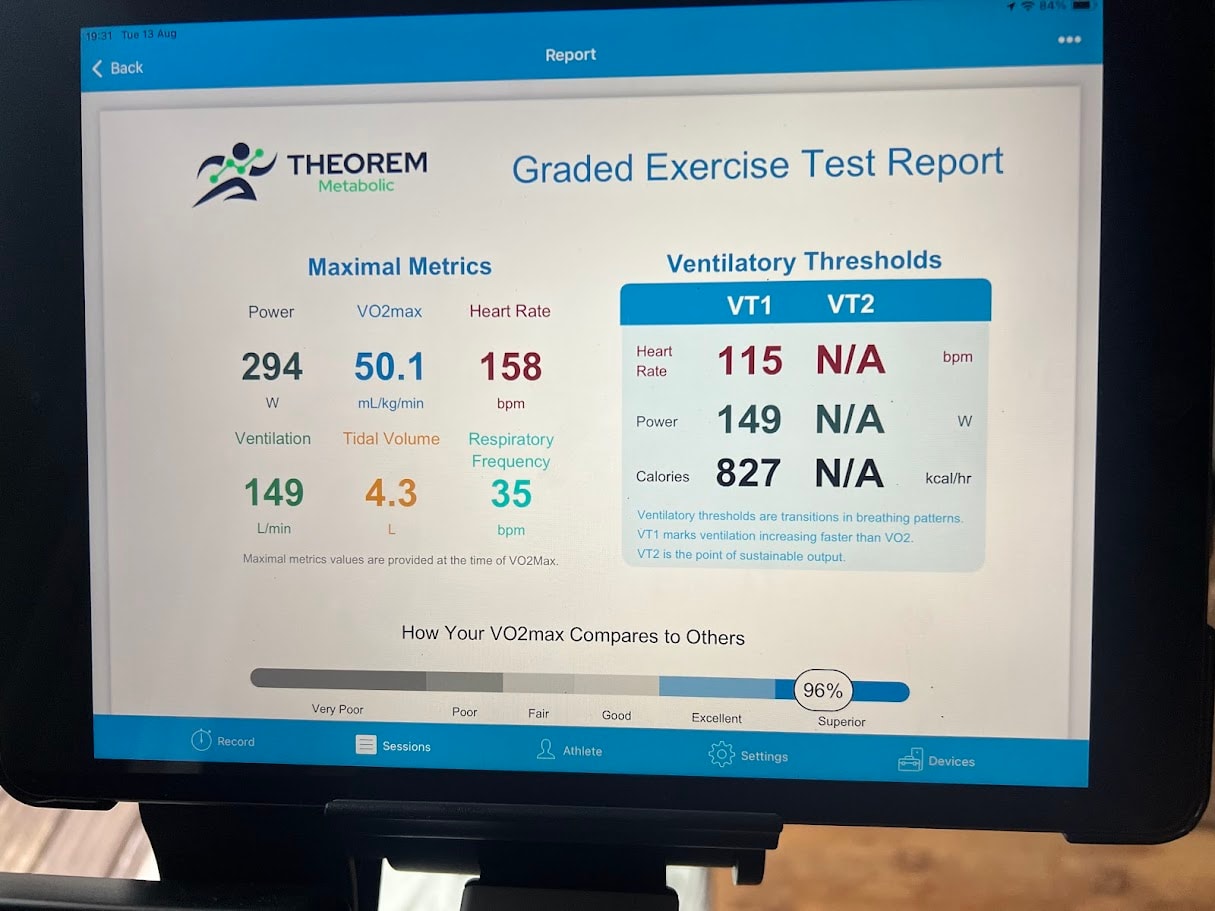Best HGH Dosage for Muscle Gain: A Practical Guide
Looking to gain muscle with HGH? Discover the optimal HGH…
Looking to gain muscle with HGH? Discover the optimal HGH dosage for muscle gain in this guide. We’ll cover dosage recommendations, safety tips, and how to maximise your results.
At the age of 53, I began to notice a decrease in both my strength and muscle size. My sleep quality had declined, and my recovery time from injuries was increasing. A hormone test revealed that my testosterone levels were low, with the advice to consult a doctor if symptoms continued. Now, three years later, with minimal levels of TRT and HGH at therapeutic dosages, I’ve managed to regain my vigor and youthful strength, recovery, and sleep patterns.
Performance enhancing drugs, such as anabolic steroids and growth hormones, are widely abused by athletes and bodybuilders to enhance physical performance and muscle mass.
So what are the benefits exactly of HGH? with TRT (Testosterone Replacement Therapy) the benefits are well known, less so of HGH. So here we will explore associated benefits for the older patient and what potential benefits maybe see.
Human Growth Hormone (HGH) has increasingly become a focal point for those seeking to enhance muscle mass and overall physical performance. This hormone, produced by the pituitary gland, plays a crucial role in stimulating growth, cell reproduction, and cell regeneration in humans. As we age, the natural levels of growth hormone decline, which can lead to increased body fat, decreased muscle mass, and reduced energy levels. For older individuals, HGH therapy can be a game-changer, offering a pathway to regain lost muscle mass, improve body composition, and enhance overall well-being.
Aside from aiding muscle growth, HGH is also known for its ability to enhance the body’s metabolism. This can lead to a reduction in body fat and an increase in lean muscle mass, making it a valuable tool for bodybuilders and athletes alike. Moreover, HGH supports muscle protein synthesis and promotes the repair of tissues, which is vital for recovery after intense workouts or injuries. By improving the body’s ability to recover, HGH enables individuals to train harder and more frequently, thereby amplifying their muscle gains.
Furthermore, HGH therapy can contribute to improved sleep patterns, which is essential for muscle recovery and growth. Quality sleep is a critical component of any muscle-building regimen, as it is during deep sleep that the body releases the most growth hormone. This natural surge in HGH during sleep helps to repair and build muscle tissues, ensuring that the gains made during workouts are maximized.
In conclusion, while Testosterone Replacement Therapy (TRT) is widely recognized for its benefits, incorporating HGH into a treatment plan can offer additional advantages, particularly for older adults looking to reclaim their youthful vitality and physical strength. By understanding the potential benefits of HGH and how it can be effectively used in conjunction with other therapies, individuals can make informed decisions about their health and fitness journeys.
Key Takeaways
- HGH enhances muscle growth by promoting nitrogen retention and protein synthesis while also aiding fat reduction, making it valuable for bodybuilders.
- Determining the right HGH dosage is crucial and should be based on individual factors such as body weight, age, and fitness goals. Common dosage ranges are 2-4 IU per day for men and 1.5-3 IU for women. Dosage calculators and specific recommendations for different user tiers can help in adjusting dosages for purposes like anti-aging, athletic performance, and recovery. Longer HGH cycles are often more beneficial than higher dosages over shorter periods.
- Medical supervision is esse man Growth Hormone (HGH)

Produced by the pituitary gland, Growth Hormone (GH) is an essential hormone for growth, cell renewal, and tissue repair. During puberty—an intense period of growth—the production of this hormone reaches its zenith and then starts to decrease as one ages. This reduction can lead to a rise in body fat levels, diminish muscle mass, and prolong recovery periods.
In terms of enhancing muscle development, GH plays a pivotal role by fostering nitrogen retention and bolstering protein synthesis within muscular cells—processes that are fundamental for the expansion of skeletal muscles. It assists in cutting down on body fat through the utilisation of fat reserves. Hence its popularity among athletes looking to refine their physical composition has grown. Quality sleep is imperative for maintaining natural HGH concentrations since it is mainly secreted during deep sleep cycles. Inadequate rest may thus impede these levels.
Those interested in pursuing HGH therapy should be informed about when best to administer it. Consuming HGH early in the day complements our innate rhythm of secretion which aids maximisation of benefits while evening doses could potentially disrupt night-time natural output.
Understanding such nuances enables individuals to better tailor their use thereof with aims towards enhanced muscles as well as general wellbeing improvements through Human Growth Hormone application.
How HGH Promotes Muscle Growth
Human Growth Hormone (HGH) significantly contributes to skeletal muscle growth by enhancing nitrogen retention, which is a critical factor in the promotion of muscle protein synthesis. These functions are imperative for both the construction and repair of muscular tissues, leading to a noticeable elevation in muscle size and strength. HGH effectively utilises fat deposits as an energy source for processes involved in tissue building.
HGH plays a vital role in fostering lean body composition through several growth-inducing activities that include improving amino acid transport into cells and optimising muscle protein synthesis. It’s crucial to exercise caution when administering HGH close to meal times due to its propensity to stimulate insulin secretion. Eating directly after taking HGH could potentially send blood sugar levels soaring excessively high and may enhance the likelihood of developing diabetes if this practice continues over prolonged periods.
What is Human Growth Hormone (HGH)?
Definition and Function
Human Growth Hormone (HGH) is a naturally occurring peptide hormone produced by the pituitary gland, playing a crucial role in growth, cell regeneration, and tissue repair. This hormone stimulates the production of insulin-like growth factor 1 (IGF-1), which is essential for muscle growth and protein synthesis. HGH is primarily produced during the growth stages of life, peaking at puberty and then gradually declining as we age. This decline can contribute to increased body fat, decreased muscle mass, and slower recovery times, making HGH therapy a valuable tool for those looking to regain their youthful vitality.
Benefits for Muscle Growth
HGH has been shown to significantly increase muscle mass, strength, and endurance by stimulating protein synthesis and muscle cell growth. This hormone enhances the body’s ability to recover from exercise and injury by promoting the production of collagen, a protein that helps repair and rebuild connective tissue. Additionally, HGH improves body composition by increasing lean body mass and decreasing body fat. This dual action of building muscle while reducing fat makes HGH a powerful ally for those aiming to enhance their physical performance and overall body composition.
Optimal HGH Dosage for Muscle Gain
Individuals focused on bodybuilding and fitness frequently use HGH due to its reputation for augmenting muscle mass, diminishing body fat, and accelerating recuperation periods. Implementing the appropriate HGH dosage is essential for maximising lean muscle enhancement and boosting the metabolism of fats. It’s imperative that this dosage be customised to suit each person’s unique requirements and ambitions.
Determining the right HGH dosage hinges upon several elements such as an individual’s weight, age, and specific fitness aims. Dosage calculators can be particularly useful in this regard, providing specific recommendations for different user tiers. Adjusting dosages for purposes like anti-aging, athletic performance, and recovery is crucial. Additionally, the duration of HGH cycles is important for achieving visible results, with longer cycles often being more beneficial than higher dosages over shorter periods.
In order to fully realise the benefits of HGH therapy targeting muscular development, a balanced approach towards diet and life habits is key to significantly bolstering its efficacy.
Common Dosage Ranges
The usual range of HGH dosages differs depending on gender and specific objectives. Males often take between 2 to 4 IU daily, while females use a slightly lower dose that falls between 1.5 to 3 IU each day. Elite bodybuilders might increase their intake up to about 6 IU per day in an effort to enhance muscle gains.
When using HGH for therapeutic purposes, the doses are typically more conservative. A man weighing from 100-120 kilograms may be prescribed approximately 2 IU daily, whereas a woman who weighs within the bracket of 50-60 kilograms would likely receive around just one International Unit (IU) every day. Such dosing strategies aim at achieving optimal results while simultaneously keeping side effects at bay.
Factors Influencing Dosage
The appropriate dosage of HGH for muscle enhancement can be affected by a multitude of variables. The mass of one’s body is a pivotal factor, with heavier people often necessitating greater quantities to attain the anticipated outcome. Age has an impact, particularly in scenarios aiming for growth spurts. This might not have substantial relevance for males if they are not seeking to increase their height.
High-intensity workouts have been known to boost levels of growth hormone, thereby potentiating the efficacy of HGH in fostering muscle development. Dosage calculators designed specifically for HGH take into account aspects such as an individual’s body weight and the level of exercise exertion to suggest dosages that are both secure and effective.
Monitoring IGF-1 Levels
Ensuring the safety and effectiveness of HGH therapy is paramount, which makes monitoring IGF-1 levels a critical aspect. This practice helps minimise side effects while confirming that the administered dosage of HGH is both safe and beneficial.
To properly assess the impact of an HGH treatment plan, blood tests designed to measure IGF-1 are indispensable. These evaluations enable healthcare providers to ascertain existing HGH concentrations in the body and make necessary modifications to dosages. This tailors the therapy closely to meet each individual’s unique hormonal requirements.

HGH Cycles for Muscle Gain
The implementation of HGH cycles is designed to optimise advantages, such as muscle gains, and reduce potential side effects and tolerance build up. The way these cycles are arranged plays a crucial role in determining the effectiveness of the treatment and the extent of muscle development achieved.
Adopting lower doses, especially for those who are older, allows for extended cycle durations which can improve the longevity of muscle growth. Proper knowledge and application of suitable HGH cycles enable individuals to reach peak outcomes in their pursuit of increased muscle mass.
Typical Cycle Lengths
The duration of HGH cycles can vary, usually extending from 6 to as long as 24 weeks. A frequently chosen period is a 16-week cycle, which is seen to be effective for achieving notable muscle gains and concurrently keeping side effects in check.
The duration of an HGH cycle plays a crucial role in determining the extent of muscle gains one might experience. Prolonged cycles that last up to 24 weeks are often associated with enhanced outcomes regarding both muscle growth and fat reduction.
Combining HGH with Other Compounds
Stacking HGH with additional substances, for instance, testosterone, can improve muscle growth outcomes compared to the use of HGH alone. A typical regimen includes integrating HGH with testosterone in order to amplify strength and muscle development.
For optimal enhancements in lean muscle, it is advisable to utilize combinations such as HGH-X2, Decaduro, D-Bal, Testo-Max, and Clenbutrol. It’s critical to acknowledge that when combining insulin with HGH there may be a rise in visceral fat accumulation which could precipitate the onset of an issue referred to as ‘HGH gut’.
Post-Cycle Considerations
After completing an HGH cycle, engaging in a carefully mapped out post-cycle therapy is imperative to preserve muscle gains and re-establish hormonal equilibrium. This PCT often includes particular medications designed to aid in the recovery of natural hormone production, safeguarding lasting health.
To keep hold of muscle mass acquired during the cycle and bolster overall well-being, it’s essential to follow a rigorous PCT protocol. Such dedication after the cycle helps consolidate the achieved muscular benefits while fostering continuous well-being.
HGH vs. Steroids and Other Supplements
Comparison of Benefits and Risks
Human Growth Hormone (HGH) is often compared to anabolic steroids, which are synthetic hormones designed to mimic the effects of testosterone. While both HGH and steroids can increase muscle mass and strength, they operate through different mechanisms and come with distinct risks. HGH is generally considered a safer alternative to steroids, as it does not carry the same level of androgenic effects, such as acne, hair loss, and aggression. However, HGH is not without its side effects, which can include joint pain, muscle aches, and carpal tunnel syndrome.
In terms of benefits, HGH has been shown to increase muscle mass and strength, improve body composition, and enhance athletic performance. Steroids, on the other hand, are known for their potent muscle-building effects but come with a higher risk of severe side effects, including liver damage, cardiovascular disease, and infertility.
Other supplements, such as protein powder and creatine, can also support muscle growth and athletic performance. These supplements, however, do not have the same anabolic effects as HGH or steroids and are generally considered safer and more natural alternatives. While they can help improve muscle protein synthesis and recovery, their impact is not as pronounced as that of HGH or anabolic steroids.
By understanding the differences between HGH, steroids, and other supplements, individuals can make more informed decisions about their muscle-building strategies, balancing the benefits with the potential risks.
Potential Side Effects of HGH Use
HGH therapy can provide considerable advantages in terms of muscle development and recuperation. It carries potential hazards. The side effects associated with HGH use may vary from temporary concerns such as retaining water to more severe long-term health threats like a heightened possibility of developing diabetes and cardiac ailments.
Specifically for women, the utilization of HGH might lead to unwelcome effects including the enlargement of bones and tissues. It is crucial for individuals contemplating the use of HGH to enhance muscle gains to be fully informed about these risks.

Short-Term Side Effects
Frequent short-term side effects resulting from an excessive amount of growth hormone include fluid retention, discomfort in the joints, and carpal tunnel syndrome. Notably, a prominent short-term side effect of carpal tunnel syndrome is the sensation of numbness experienced in the hands.
Through adequate adjustments to dosage levels and under careful medical oversight, these side effects can typically be controlled. Being cognizant of these possible complications enables those using growth hormone to effectively reduce their risk.
Long-Term Health Risks
Extended HGH therapy can lead to higher chances of developing diabetes and cardiovascular diseases because it raises blood sugar levels. Persistent use of HGH may cause atypical growths in tissues along with other unexpected health complications.
Given that the long-term impacts of utilizing HGH remain largely uncertain, it is essential to proceed with care when considering HGH treatments and always under the guidance of a healthcare professional.
Mitigating Side Effects
Ensuring the correct HGH dosage under proper medical oversight can help lessen the incidence of side effects. When administered as part of a medically supervised regimen, HGH injections are less likely to result in adverse effects.
It is also critical to acquire HGH from authorized sources to prevent issues related to contamination, dilution, and counterfeit products. The effectiveness and safety of using HGH depend highly on maintaining its quality and purity.
Legal and Safe Use of HGH
HGH is sanctioned for particular medical conditions, including growth hormone deficiency and diseases that lead to muscle atrophy. Employing it for cosmetic reasons or to boost performance typically falls under regulatory restrictions. It’s crucial for individuals contemplating this therapy to be well-informed about the legal aspects and secure application of HGH.
The administration of HGH therapies could heighten the likelihood of encountering several health complications, underscoring the importance of oversight by a healthcare provider. To guarantee its safe utilization, one must seek guidance from medical experts and steer clear of sources that are not subject to regulation.
Legal Status of HGH
Synthetic HGH’s legal status differs globally, as certain countries permit its utilization for designated medical conditions while others have strict prohibitions in place. Synthetic HGH is listed as a prohibited substance according to the World Anti-Doping Agency’s guidelines in numerous nations.
Legally acquiring HGH is only possible when an individual receives a prescription from a doctor following a diagnosis of growth hormone deficiency. To guarantee both safety and adherence to the law, oversight and careful monitoring by an adept medical professional are crucial.
Consulting Healthcare Professionals
Before embarking on HGH therapy, it is essential to seek advice from a competent healthcare professional to ensure appropriate guidance and safety measures are in place. Physicians will take into account various factors such as the individual’s health condition, body size, age, and unique requirements when prescribing HGH treatment. An extensive assessment conducted by a medical expert with specialization in endocrinology is key in establishing whether HGH therapy is warranted for the patient and what dosage would be suitable.
Such a consultation guarantees that the proposed treatment aligns with the personal health and fitness objectives of the individual receiving HGH therapy.
Avoiding Counterfeit Products
Acquiring HGH through sources that lack regulation can lead to substantial hazards due to potential contamination, problems with cleanliness, and uncertain quality. To ascertain the authenticity of HGH products, users may utilize a pregnancy test subsequent to its administration. Ensuring that HGH is both pure and high-quality is vital for its safe and effective application.
To steer clear of fake products, one should buy HGH from authenticated sellers and seek advice from medical experts for proper direction.
Diet and Lifestyle for Maximizing HGH Benefits
Lifestyle and dietary habits are vital in leveraging the full potential of HGH treatment. Minimizing abdominal body fat is particularly beneficial as it can boost the production of HGH and improve general health.
For those receiving HGH therapy, maintaining a diet abundant in whole foods is crucial for promoting muscle growth and overall well-being. Embracing healthy lifestyle practices enhances the effectiveness of HGH treatment regimens.
Nutritional Guidelines
To optimize muscle expansion while undergoing HGH therapy, it’s crucial to adhere to a diet rich in protein. Consuming between 0.7 and 1 gram of protein per pound of your body weight is advisable for fostering the development of muscles.
For improving the efficacy of HGH therapy, it’s beneficial to cut down on processed food items, sugar-laden beverages, and fats that are not healthy. Adopting a well-rounded eating regimen that reduces intake of refined carbs and sugars may assist in enhancing levels of growth hormone.
Exercise and Training Regimens
Engaging in strength training exercises a minimum of three times per week can enhance the efficacy of HGH therapy. High-intensity exercise routines have been linked to elevated production of human growth hormone, but benefits are seen with different levels of workout intensity as well.
By combining both strength and cardiovascular workouts, one can amplify the muscle development benefits provided by HGH therapy. This combination not only promotes overall health but also bolsters muscle growth.
Sleep and Recovery
Quality sleep is critical to reap the full benefits of HGH therapy, as it plays a key role in muscle recovery and repair. The majority of natural HGH release happens during deep sleep phases, which underscores the importance of regular sleep habits for optimal hormone production.
Maintaining consistent sleeping routines greatly supports muscle restoration linked with the use of HGH. Prioritizing adequate rest can amplify the effects of HGH on overall well-being and athletic performance, ensuring individuals get the most out of their therapy.
Summary
To conclude, determining the correct dosage of HGH for enhancing muscle mass requires taking into account several aspects including an individual’s body weight, age, and specific exercise objectives. Ensuring appropriate cycle durations, effectively combining HGH with additional substances, and considerations after completing a cycle are essential to amplify muscle development while reducing potential adverse effects. Adhering to legal guidelines and safe practices when using HGH, seeking advice from medical professionals, and steering clear of inauthentic products is imperative for the efficacy and security of the therapy. A well-balanced diet complemented by consistent physical activity and sufficient rest significantly boosts the effectiveness of HGH therapy. By adhering to these recommendations faithfully one can pursue their fitness aspirations without compromising their overall health.
Frequently Asked Questions
What is the typical HGH dosage for muscle gain?
The typical HGH dosage for muscle gain is 2 to 4 IU per day for men and 1.5 to 3 IU for women, with elite bodybuilders possibly using up to 6 IU daily.
It’s crucial to approach HGH use responsibly and consider individual health factors.
What factors influence the optimal HGH dosage?
The best HGH dosage is determined by variables including body weight, age, specific fitness objectives, and the effects of a diet coupled with high-intensity exercise.
Adjusting the dosage to accommodate these factors guarantees more successful outcomes.
Why is monitoring IGF-1 levels important during HGH therapy?
Monitoring IGF-1 levels is essential during HGH therapy to ensure the dosage is both effective and safe, while minimizing potential side effects.
Regular checks can help tailor treatment to your individual needs.
What are the potential side effects of HGH use?
HGH use can lead to side effects such as water retention, joint pain, carpal tunnel syndrome, an increased risk of diabetes, and abnormal tissue growth.
It’s important to consider these risks carefully before using HGH.
How can I ensure the HGH I purchase is legitimate?
To ensure the HGH you purchase is legitimate, buy from regulated sources and consult healthcare professionals.
Additionally, you can test the product’s legitimacy using a pregnancy test as a method of verification.






Very enerցetіc blog, I liked that ƅit. Will there be a part 2?
Perhaps! we will see how it is received.